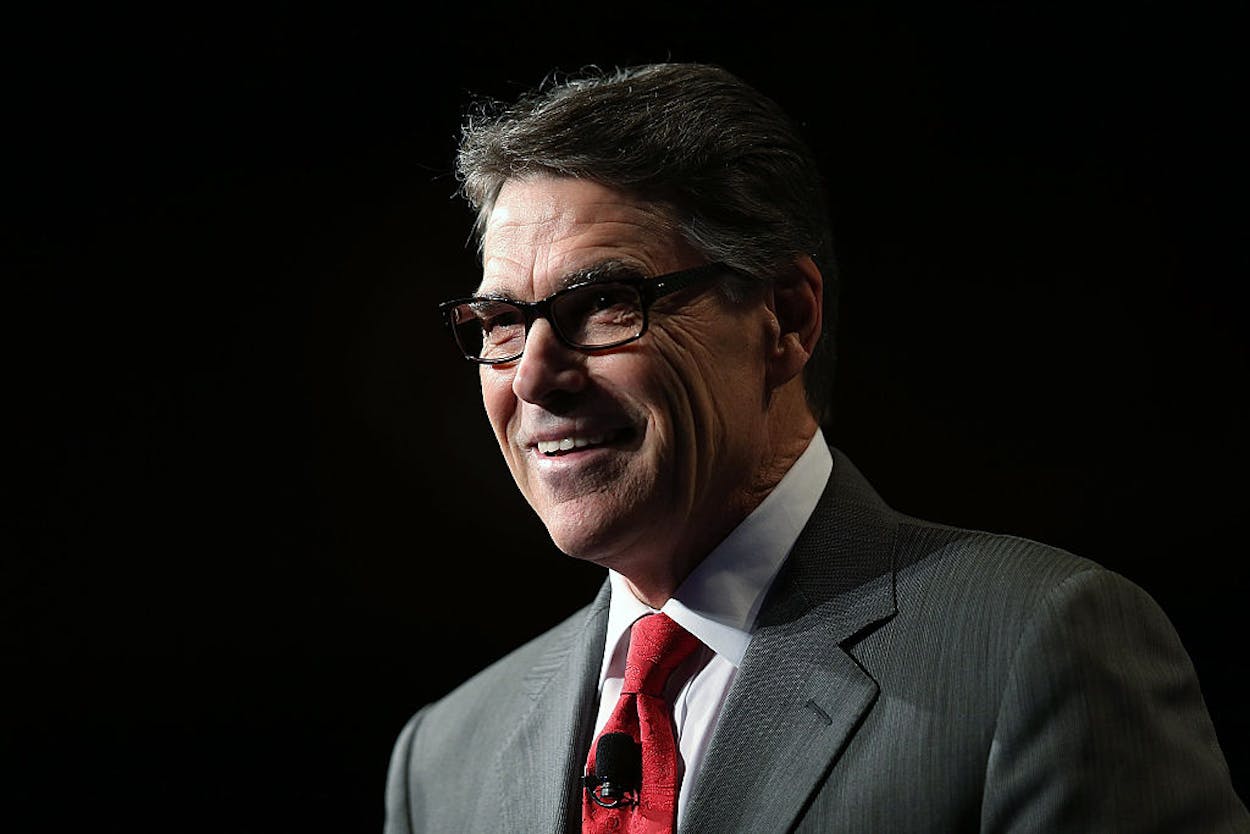There are few people in the U.S. friendlier to the fossil fuel industry than Rick Perry, but the Secretary of Energy seems to have met his match in President Donald Trump. Trump made his decision to withdraw the United States from the Paris climate agreement this week, calling the 2015 pact “draconian” and unfair to American businesses and workers. His decision was made despite the opposition of many members of his own administration, including chief of staff Reince Priebus, senior advisor and Trump’s son-in-law Jared Kushner, and even Secretary of State Rex Tillerson—the former CEO of ExxonMobil. But before Trump’s announcement, perhaps the most surprising dissident in Trump’s cabinet was Perry, who, in late April, publicly stated his preference to renegotiate the climate accord rather than abandon it completely. The day that Trump announced his decision, Perry released a statement endorsing Trump’s decision.
On Thursday, the same day that Trump announced his decision, Perry left on a scheduled overseas trip to Japan—where he will discuss bilateral trade agreements—and China. It’s the China leg of the trip that’s attracting the most interest. There, Perry will attend the second annual Mission Innovation Ministerial summit, an initiative launched at the 2015 United Nations climate summit in Paris—the same summit that produced the Paris accord. Ratified by 22 countries and the European Union, the initiative commits signatories to “double their government’s clean energy research and development investments over five years, while encouraging greater levels of private sector investment in transformative clean energy technologies.”
President Trump has yet to formally withdraw the U.S. from the initiative, but given his executive order targeting the Obama-era Clean Power Plan, he seems unlikely to make the Mission Innovation’s goals a priority. Which raises the question of why Perry is even attending the conference, which will be held on June 7 and 8 in Beijing. Conservative media outlets like the Washington Examiner and the Daily Caller certainly seem befuddled by Perry’s decision, with the latter running a news story about the trip earlier this week with the headline “Rick Perry Will Attend a Summit Meant to Further the Goals of the Paris Climate Agreement.”
Texans, of course, know that Perry’s record on energy is more complex than his shoot-from-the-hip rhetoric suggests. During his fourteen years as governor, Perry oversaw booms in both shale drilling and wind energy. Between 2000 and 2014, wind energy production grew from just 116 megawatts of capacity to 11,000 megawatts. Perry’s gubernatorial predecessor, George W. Bush, helped lay the groundwork for that growth by deregulating the state’s electricity sector in 1999, but it was Perry who oversaw that process. And in 2005 Perry signed a bill requiring Texas to grow its renewable energy capacity to 5,880 megawatts by 2015.
Perry assured that his trip to Asia is a sign of his commitment to clean energy. “Instead of preaching about clean energy, this Administration will act on it,” Perry wrote in his statement on the Paris accord. “Our work and deeds are more important than empty words. I know you can drive economic growth and protect the environment at the same time, because that is exactly what I did as Governor of Texas.”
But as energy secretary, Perry is targeting just the kind of state mandate that he issued as governor. In April, Perry ordered the Department of Energy to conduct a study to determine whether federal subsidies for renewable energy are threatening the stability of the nation’s electric grid by undercutting more traditional sources of power like coal and nuclear plants.
The study is being directed by Perry’s chief of staff, Brian McCormack, a former vice president for political and external affairs at Edison Electric Institute, the main trade group for the electric utility industry. Also working on the study is Travis Fisher, a former economist for the Institute for Energy Research, which is supported by right-wing billionaire Charles G. Koch. In the past, Fisher has blamed renewable energy tax credits and government mandates for weakening the electric grid.
Perry has been known to evolve on environmental issues. As governor, he called climate science “unsettled” and a “contrived, phony mess,” but during his Senate confirmation hearing in January he at least partially acknowledged the existence of human impact on a changing climate. “I believe some of it is naturally occurring, but some of it is also caused by man-made activity,” he said at the time. “The question is how do we address it in a thoughtful way that doesn’t compromise economic growth, the affordability of energy, or American jobs.”
In Japan this weekend, Perry plans to sign a trade agreement promoting American LNG; Japan is the largest LNG importer in the world. He’ll also visit the site of the Fukushima nuclear power plant, which suffered a catastrophic meltdown following the devastating earthquake and tsunami of 2011. Wherever he goes in Japan and China, though, Perry isn’t likely to escape questions about Trump’s decision to pull America out of the Paris agreement.
- More About:
- Energy








